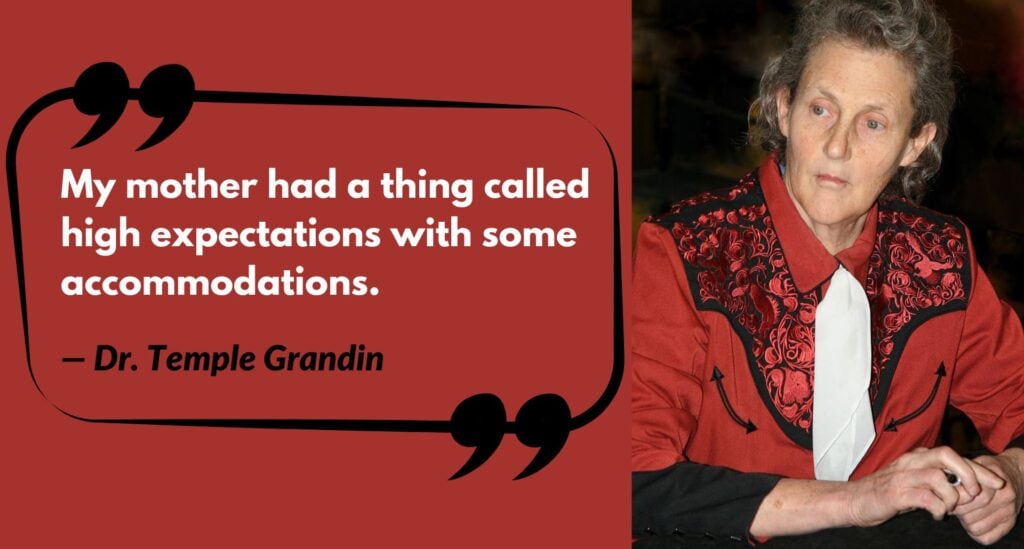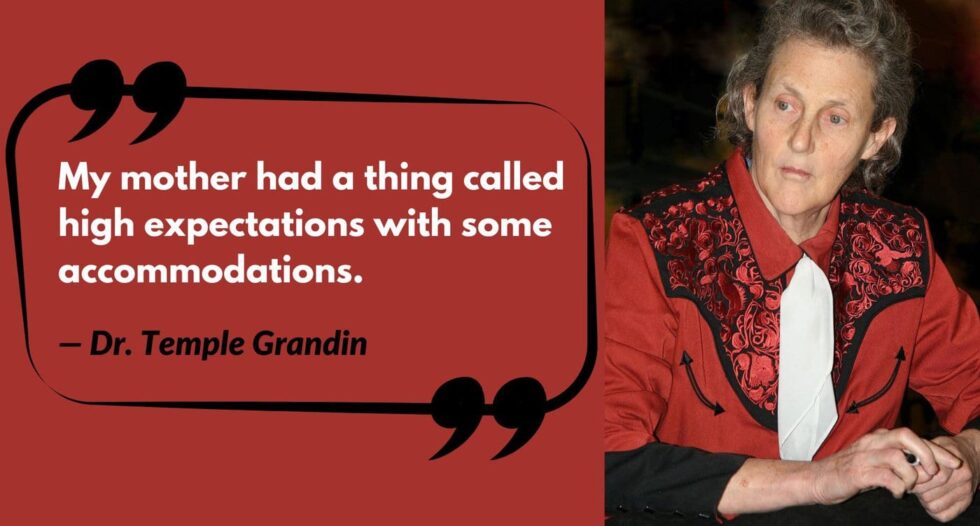Edited By Brandi Neal, Radical Candor podcast writer and producer, and director of content creation…
Temple Grandin Talks About Why Clear Feedback for Neurodivergent Individuals Matters
Edited By Brandi Neal, Radical Candor podcast writer and producer, and director of content creation for Radical Candor. This article about Temple Grandin and the importance of clear feedback for neurodivergent folks has been adapted from the Radical Candor podcast S7, Ep. 7 transcript about the same topic.
Feedback in the workplace is a fundamental tool for growth and improvement, but when it is vague or generalized, it can become ineffective—or even detrimental.
This is particularly true for neurodivergent individuals, who often need direct, actionable guidance at work in order to understand what’s expected.
The Pitfalls of Vague Feedback for Neurodivergent People
Kim Scott, author of Radical Respect and Radical Candor, frequently fields questions about why it’s important to be specific and clear when practicing Radical Candor.
While everyone benefits from clear communication, this is especially true for neurodivergent individuals.
My mother had a thing called high expectations with some accommodations.” — Dr. Temple Grandin
In a conversation with Dr. Temple Grandin, a world-renowned inspirational autism activist, author of 28 books, and an animal welfare and behavior expert, Grandin explains that vague feedback does not work for autistic individuals because it lacks the specificity they need to understand what actions to take.
She points out that general comments like “you’re rude to colleagues” are unhelpful, whereas direct instructions, such as being told exactly what she needed to do and why, allowed her to correct her behavior effectively.
She likens it to teaching someone how to behave in a foreign country, where clear examples help navigate social expectations.
A Lesson in Specificity for Neurodivergent Minds
Grandin shared a defining experience that highlights the importance of specificity in feedback. “Vague feedback does not work,” Grandin stated bluntly. She recalled an incident from early in her career when she criticized a welder’s work by saying it looked like “pigeon doodoo.”
The response from her supervisor, however, was a masterclass in effective feedback. “An engineer at the Swift plant, Harley, was a very good job coach. He quietly pulled me into his office and told me, ‘Whitey, the welder, is up in the cafeteria on break. You are going to apologize to him for that kind of rude talk.’ He also explained to me how Whitey was his employee, and if I didn’t like the welding, I should have come to him instead.”
This moment was pivotal for Grandin. “He told me exactly what I should do in private. He didn’t just say, ‘You’re rude to colleagues.’ That wouldn’t have helped.”
Why Specific Feedback for Neurodivergent Folks Works
Grandin agreed, emphasizing that neurodivergent individuals frequently process communication differently. “My mother had a thing called high expectations with some accommodations,” she said.
This is where the Radical Candor principle, “Feedback is not measured at the speaker’s mouth but at the listener’s ear,” applies. How one person needs to hear feedback in order to take action is different than how another person needs to hear it.
“A lot of autistic people have some hygiene issues, for example. There’s a scene in the HBO movie about my life where they slam down the deodorant and say, ‘You stink.’ That happened to me. I wanted that job, so I cleaned up.”
While some people would be offended by such a direct approach, Grandin said she doesn’t think in generalities and needs clarity in order to take action.
If you need help making your feedback specific and actionable, using the Radical Candor CORE method can help.
- C — Context: “I’ve noticed that during our afternoon team meetings, there is a strong odor in the room.”
- O — Observation: “I have identified that it is coming from your area and seems to be related to body odor.”
- R — Result: “This has been distracting for the team and may be affecting everyone’s comfort and focus during meetings. Addressing this will help maintain a professional and comfortable work environment.”
- E — Expected next steps: “I recommend using deodorant daily and ensuring that your clothes are clean. If you need recommendations on products, I’m happy to help. Please take steps to address this by our next meeting.”
Applying Specific Feedback to Job Performance
“You might want to say, ‘I want you to develop a translation program that can convert slang from English into French,’” she explained. “That’s an example of something specific.”
Scott noted that some managers fear that being too direct might feel like micromanagement, but Grandin clarified that it’s about defining clear expectations.
“You don’t tell them how to do the program,” she said. “But you do need to define the parameters.”
This means setting clear objectives, such as specifying the program’s purpose, outlining its key functionalities, and establishing a deadline for completion.
Creating an Inclusive Workplace

Providing feedback in a way that is both specific and actionable benefits everyone in the workplace, but for neurodivergent employees, it can make the difference between thriving and struggling.
Clear guidance fosters not just better performance but also stronger workplace relationships and a deeper understanding of expectations.
“Let’s avoid the rapid multitasking chaos, like a McDonald’s takeout window,” Grandin said.
Ultimately, as Grandin’s experience illustrates, feedback is most effective when it is specific, private when necessary, and immediately actionable.
When leaders take the time to refine their approach, they create an environment where all employees can succeed—on their own terms.
Feedback for Neurodivergent Employees: Temple Grandin’s 3 Tips
- Be Specific and Direct – Vague feedback, such as “be more professional” or “be a team player,” does not provide clear guidance. Neurodivergent individuals often benefit from explicit instructions, like Grandin’s example where her supervisor told her exactly what to do: apologize to the welder and follow the chain of command in the future.
- Provide Clear Parameters Without Micromanaging – Instead of giving broad assignments like “develop new software,” define specific objectives such as “create a translation program for converting slang from English to French.” This approach allows employees to understand expectations while maintaining autonomy in their approach.
- Use Private and Actionable Feedback – Delivering feedback in a private, helpful manner helps neurodivergent employees process and act on it effectively. Grandin emphasized that her supervisor’s calm, direct approach made it easy for her to correct behavior without unnecessary embarrassment or confusion.
- Take the Radical Candor quiz >>
- Sign up for our Radical Candor email newsletter >>
- Listen to the Radical Candor podcast >>
- Shop the Radical Candor store >>
- Get the “Radical” books >>
- Get Radical Candor coaching and consulting for your team >>
- Get Radical Candor coaching and consulting for your company >>
If you understand the importance of receiving feedback in the workplace, then you need The Feedback Loop (think Groundhog Day meets The Office), a 5-episode workplace comedy series starring David Alan Grier that brings to life Radical Candor’s simple framework for navigating candid conversations.
We’re offering Radical Candor readers 10% off the self-paced e-course. Follow this link and enter the promo code FEEDBACK at checkout.




